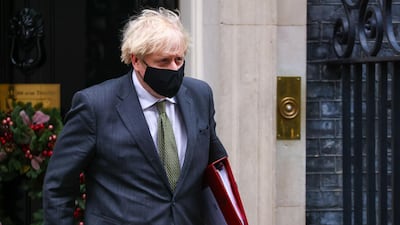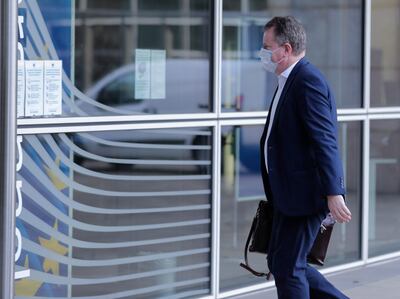Prime Minister Boris Johnson has said the EU is insisting on terms for a Brexit deal that "no prime minister could accept".
He ruled out agreeing to the EU’s existing proposals on fisheries and enforcement of fair competition rules for businesses.
That came after Germany’s Angela Merkel said any UK-EU trade deal will hinge on agreeing to regulations on competition applying in future.
Mr Johnson told Parliament: “Our friends in the EU are currently insisting that if they pass a new law in the future with which we in this country do not comply or don’t follow suit, then they want the automatic right to punish us and to retaliate.
“They’re saying we should be the only country in the world not to have sovereign control over its fishing waters. I don’t believe that those are terms any prime minister of this country should accept.”
He also said “a good deal is still there to be done” and that he was looking forward to discussing it with von der Leyen at dinner.
Earlier, German Chancellor Angela Merkel said the EU and Britain could still reach a deal but the bloc's remaining 27 members were prepared to live with no deal if necessary.
A wrestle over so-called "level playing field" rules, which would prevent Britain undercutting EU standards on issues such as labour and environmental standards, is still to be resolved, she told German lawmakers.
Berlin has full confidence in the European Commission to pursue the Brexit negotiations, Mrs Merkel said ahead of talks between Mr Johnson and Commission President Ursula von der Leyen in Brussels on Wednesday.
"There is still the chance of an agreement... We are continuing to work on it, but we are also prepared for conditions which we cannot accept," she told the German parliament.
"One thing is clear: the integrity of the internal market must be preserved. We must have a level playing field, not just for today but for tomorrow and beyond... Otherwise, unfair competition conditions arise to which we cannot subject our companies," she said. "This is the really big question."
"The 'now or never' moment is here," said analysts at financial services firm ING in a note to clients. "The meeting will tell us a lot.”
The Prime Minister’s talks with Ms von der Leyen are a last-ditch bid to salvage a Brexit trade deal, the planned dinner seen as a make-or-break attempt to get an agreement over the line before Britain frees itself from EU trading rules on December 31.
It follows weeks of deadlocked negotiations between the two sides, which still disagree on fishing rights and how any agreement will be regulated, as well as the level playing field issue.
Mr Johnson is to work through a list of major sticking points with Ms von der Leyen, who will then update the 27 leaders of UN member states on the status of a deal at the EU council meeting on Thursday.
“I look forward to welcoming UK Prime Minister Boris Johnson tomorrow evening. We will continue our discussion on the partnership agreement," Ms von der Leyen tweeted on Tuesday.
Although a deal is not expected to be reached during the dinner, Downing Street hopes, if there is progress and goodwill, that trade talks could resume on Friday after the EU summit.
Earlier, it emerged that UK will not rip up parts of its Brexit divorce agreement with the EU after striking a pact over the thorny issue of Northern Ireland.
The British government said on Tuesday afternoon it had reached agreement with the EU on how trade would work with Northern Ireland, the only part of the UK that shares a land border with the bloc.
Under an arrangement known as the Northern Ireland protocol, goods will not need to be checked at the Irish border but the region will still need to enforce the EU’s customs products rules.
However, some checks would need to be carried out on certain goods entering Northern Ireland from the British mainland.
Both sides had been in disagreement over how those checks would be carried out.
The EU was also furious when the UK drafted clauses into its Internal Markets Bill that would allow it to tear up parts of the protocol, but the UK will now drop those clauses as part of its agreement with the EU.
News of a resolution to the Northern Ireland row may help to ease talks on the bigger issue of a free trade deal but Mr Johnson said both sides were still a “long way apart”.
Talks between the UK and its biggest trading partner were on the verge of collapse after negotiators failed to reach agreement during last-ditch meetings on Monday.
A follow-up phone call between Mr Johnson and Ms von der Leyen also failed to resolve the stand-off.
If a deal is not forged before the transition period ends on December 31, it could cost hundreds of thousands of jobs on both sides and disrupt cross-Channel trade for years to come.
Mr Johnson said on Tuesday the situation was awkward and a time might come when the UK walked away from talks.
"I am always hopeful but I have to be honest with you, the situation at the moment is tricky," he said. Our friends have to understand the UK has left the EU to exercise democratic control. We are a long way apart still.”
Asked if he would try to strike a deal right up to the wire, Mr Johnson said: "Of course. We're always hopeful but there may come a moment when we have to acknowledge that it's time to draw stumps and that's just the way it is."
He said Britain would “prosper mightily” whether an agreement was reached or not.
“As agreed on Saturday, we took stock today of the ongoing negotiations," Ms von der Leyen and Mr Johnson said in a joint statement after their phone call on Monday.
“We asked our chief negotiators and their teams to prepare an overview of the remaining differences to be discussed in a physical meeting in Brussels in the coming days.”
Mr Johnson was reportedly reluctant to travel to Brussels after his predecessor, Theresa May, was humiliated repeatedly when her plans were publicly rejected by the bloc while she was in the Belgian capital, the seat of the European Council.
But he accepted that the potential benefits of a visit outweigh the risks.


